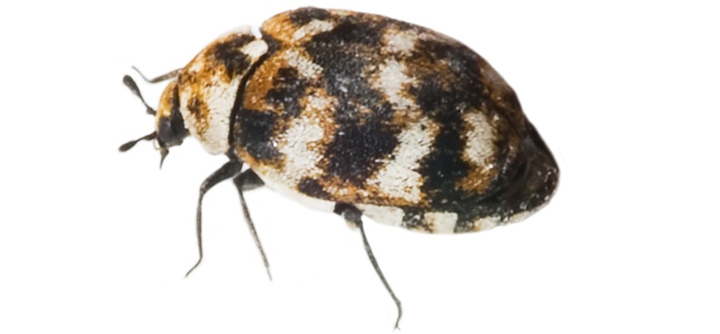Carpet Beetles

Origins and distribution
World-wide, commonly found throughout Europe and the UK.
Characteristics
Larvae are a brown/cream colour and are 3 – 4 mm in length, these are known as ‘woolly bears’ due to being covered in short bristles. The adults are 1.5 – 4 mm in length and usually patterned with white, pale yellow, brown and black scales, producing a striking ‘W’ shape on their shell. They have short clubbed antennae.
Breeding
Females can lay up to 100 eggs during the summer months. These are 0.5 mm long and cream in colour, taking anything from 10 – 30 days to hatch depending upon temperature. Larvae take several months to develop and go through 5 moults before pupating in February or March. Pupation takes about 10 days when adults emerge, which live for about 2 – 6 weeks.
Habits
Commonly often associated with bird’s nests where the larvae feed on guano and feathers. Larvae are the cause of damage by feeding on natural products such as wool, tapestries, skins and furs. Adults are frequently seen on window sills where they are attracted to the light.
Signs of activity
- Damage to fibres of carpets, bedding or clothing.
- Damage to animal fur and skins.
Importance
The variegated carpet beetle and its relatives, such as the two spot carpet beetle (Attagenus pellio) can damage the fibres of carpets, and other woollen products such as soft furnishings and clothing. Can also be a serious pest to museum collections.
How we control Carpet Beetles
We would advise where possible the infested material should be removed from the area, and if really damaged disposed of. Mechanical removal by vacuuming of the area is essential in removing larvae and eggs where possible, followed by an application of a residual insecticide onto the carpet area. This is applied by a fully trained technician using appropriate protective clothing and using a hand held compression sprayer. Pets should not be in the home at the time of treatments and particularly cats are sensitive to the treatment process and chemicals used. The technician will advise you on this before attending and treatment is undertaken.


















